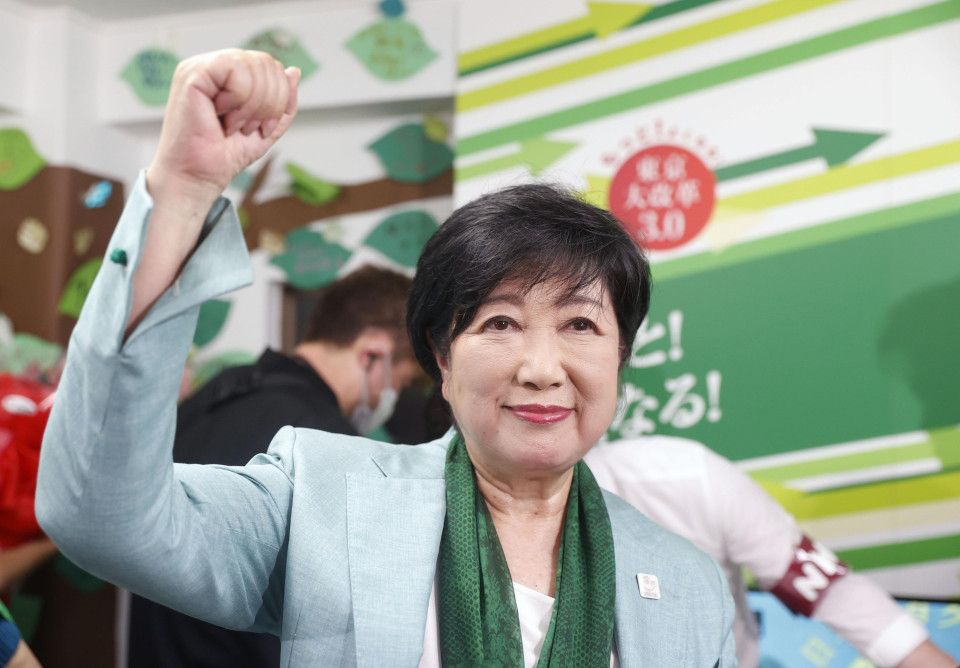
Tokyo’s current governor, Yuriko Koike, was re-elected in Sunday’s gubernatorial election with the effective backing of the ruling party.
According to Kyodo News, Koike, 71, secured a third consecutive four-year term, defeating Shinji Ishimaru, a 41-year-old social media-savvy former mayor of Hiroshima prefecture who was narrowly contesting the second spot with Renho, a 56-year-old former lawmaker backed by the main opposition party.
The election was initially expected to be a head-to-head between Koike and Renho, both former TV presenters. However, Ishimaru, relatively unknown in Tokyo before the official campaign began, significantly boosted his profile by expanding his campaign activities through social media.
Ishimaru appeared to have garnered popularity from voters with no particular party affiliation, as a recent political funding scandal eroded trust in politics, but it was not enough to catch up with Koike. After polls closed, he spoke to a group of supporters and said, “I did everything I could.”
Sunday’s election was closely watched as the outcome could affect the future course of national politics, with the Liberal Democratic Party led by Prime Minister Fumio Kishida under heavy scrutiny in the wake of the secret funds scandal revealed late last year.
The contest was also seen as a proxy war between national parties, as the conservative incumbent was challenged by the left-leaning opposition politician, while the election was criticized for prioritizing popularity over policies due in large part to undecided voters.
In 2024, a record number of 56 people, including former Air Self-Defense Forces chief Toshio Tamogami, 75, ran for office. According to political experts, many candidates ran solely to gain fame through campaign broadcasts and posters.
Some Tokyo gubernatorial candidates have been criticized for flouting the election process by putting up sexually explicit posters or covering large parts of official campaign boards with their materials, and some groups have obstructed the election campaigns of others.
Koike told supporters on Sunday: “I have been threatened and booed. It has been the toughest election campaign I have ever experienced,” stressing the need to change the legislation relating to the electoral system.
Japan continues to support Argentine culture with a new donation
In the last Tokyo gubernatorial election, all candidates up for re-election won, but this year’s election sparked enthusiasm among voters, who were able to choose from a wide range of candidates.
After the media reported his defeat, Renho said: “I was able to express my thoughts from the bottom of my heart thanks to the support of many people, and I did my best,” adding that Sunday’s result was due “to my lack of ability.”
The governor of Japan’s capital, home to some 14 million people, controls an annual budget of more than 16 trillion yen ($100 billion), roughly equivalent to the national spending of Sweden or the Czech Republic.
Koike became Tokyo’s first female governor in 2016. The former LDP lawmaker was also Japan’s first female defense minister, while Renho was a member of the Constitutional Democratic Party of Japan before running for governor.
The LDP did not field its own candidate, as support for the ruling party has plummeted to its lowest levels since it returned to power in 2012 after a brief stint in opposition. It decided to support Koike alongside its younger coalition partner, the Komeito party.
Yuko Obuchi, the LDP’s election campaign manager, said Koike’s victory could “provide a big advantage in the upcoming elections, but restoring trust in politics is still a work in progress,” and another party lawmaker said: “This is not a triumph for the LDP.”
Renho, who was minister in charge of administrative reform during the three-year rule of the defunct Democratic Party of Japan from 2009, had the backing of the CDPJ, the Japanese Communist Party and the Social Democratic Party.
Ishimaru, a former banker, has drawn attention for his YouTube posts, which show harsh exchanges with municipal assembly members. He has broadened his support base among the younger generation and gathered thousands of volunteers for his campaign.
On the political front, Koike has touted child education support measures, such as cash-distribution programs, as one of her achievements during her eight years in office. Critics, however, argue that she has failed to deliver on most of her previous campaign promises.
In the last election, Koike promised to focus primarily on supporting families and child-rearing, while Renho pledged to improve policies to benefit members of the younger generation who wish to have children.
Renho said a central issue would be how to handle the controversial redevelopment of the Meiji Jingu Gaien district, which would involve the demolition of two historic sports facilities and the felling of hundreds of trees. Koike has given the green light to the project.
Ishimaru, for his part, presented himself as a candidate “well versed in economic theories and practices” and promised to give 1 million yen to the presidents of the student councils of Tokyo’s public high schools.
Asked about his future ambitions, he told reporters: “One option is to run” for the House of Representatives elections “from Hiroshima District No. 1, which is Prime Minister Kishida’s constituency,” indicating the possibility of entering the national political arena.
Voter turnout in Sunday’s gubernatorial election was 60.62 percent, up from 55.00 percent in the 2020 election, the Tokyo Metropolitan Election Management Committee said.
Source: https://reporteasia.com/politica/2024/07/08/la-gobernadora-de-tokio-koike-reelegida-vence-al-opositor-renho-ex-alcalde-en-ascenso/

